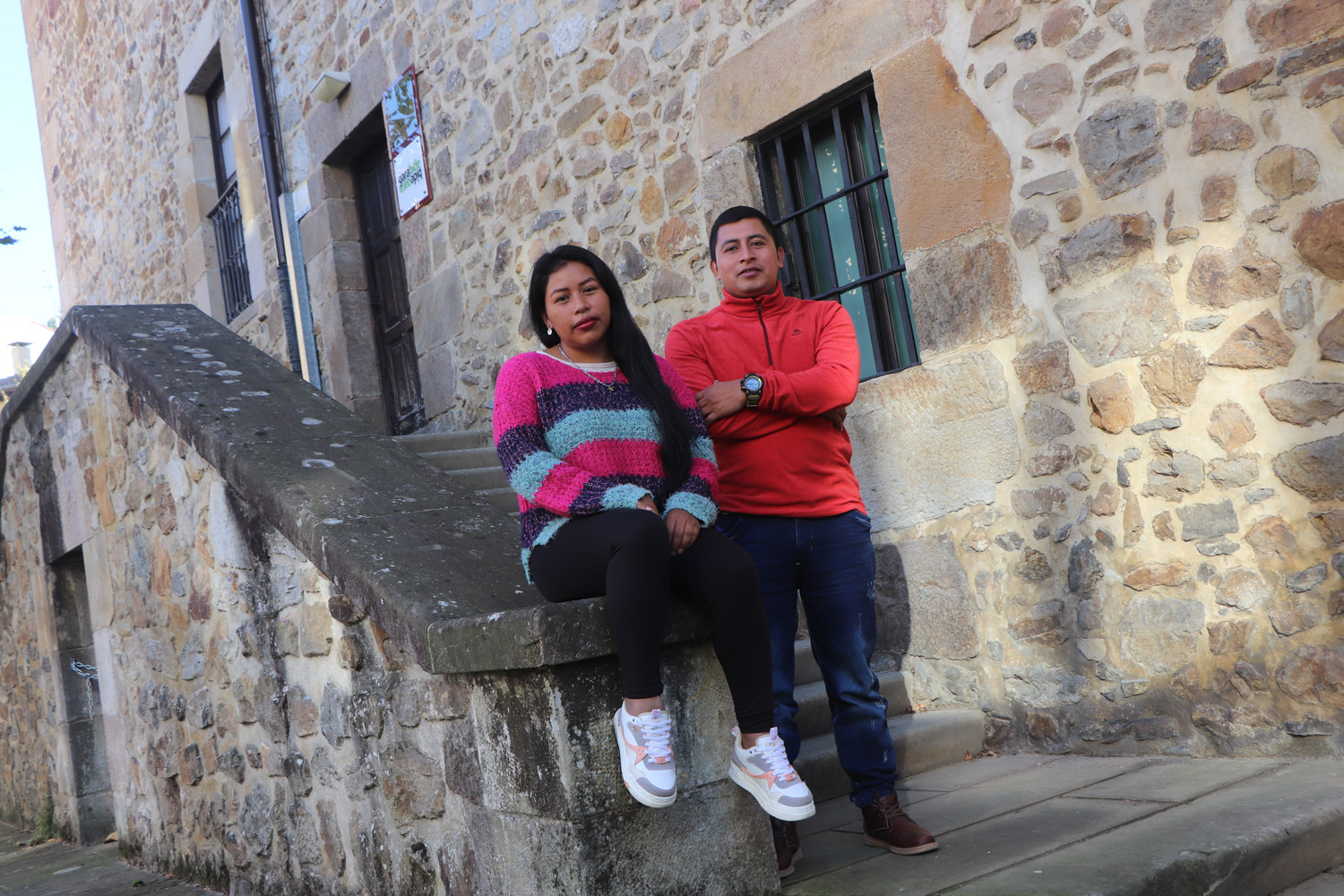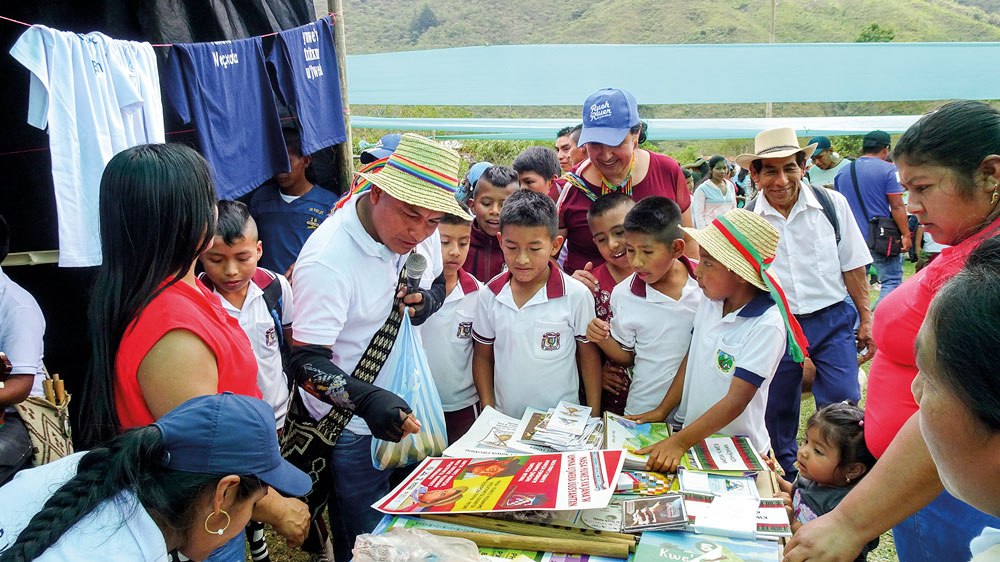"Our main struggle is the liberation of Mother Earth, we are recovering the lands that took us from the conquest"
- Johana Acosta, from Colombia, is indigenous nasa. Cauca fights for the rights of indigenous women in the North, “but above all I am the daughter of Moses Acosta Zapata and Ana Tulia Zapata,” says Acosta. During these days, he has accepted the invitation of the Mundubat Foundation and has moved to Euskal Herria to explain the work of his organization, the Association of Indigenous Cabildos Norte del Cauca (ACIN). “Being here, I’ve realized that indigenous nasa have struggles shared with the Basques. We are all in the struggle to protect our culture and our customs, trying to unlearn what they have taught us.”

In 1971, Afro-descendants, peasants and indigenous people of Colombia decided to organize their struggle. The latter are the Regional Indigenous Council (CRIG). “That was the mother of ACIN.” In 1994, they opted for decentralization and were divided into nine groups. One of them is ACIN, which focuses its work in Northern Cauca. However, the lines of struggle are the same for all groups: unity, land, culture and autonomy.
It coordinates the Johana Acosta Women's Programme ACIN, in which it has been in existence for six years. This programme regains the knowledge of indigenous peoples to empower women and overcome the violence they have suffered: “We call it the healing process.”
What would you say is the great challenge of the Nasa people?
Of course, the liberation of Mother Earth is the main demand of our struggle. Not only for indigenous people, but for all indigenous peoples. Gradually we are recovering the lands occupied by the landowners in the conquest. We are fighting for the recognition of our right to be on those lands for a long time. They were the lands of our ancestors and, therefore, they are ours.
"Every woman has her spirituality, so we make sense of our lives."
You are particularly demanding the rights of indigenous women.
With the creation of ACIN, we are committed to the creation of a Women’s Programme. We women suffer various forms of violence because we are women, and not just physical. For example, we have very little participation in political spaces. I can proudly say that my mother, Ana Tulia Zapata, was also the coordinator of this program.
It therefore comes to him by succession.
(Laughing) Yeah, that's right, my passion for the resistance he received from my parents. In addition, I think it is a very enriching programme. On the one hand, we have training to work on human rights and the rights of indigenous women. That's where we get the information and the tools that we need to organize with each other. Thanks to it we have women who today are rulers or leaders in the North of Cauca. We're collecting sown seeds.
We also work on the political impact within the organisation. In fact, men of ACIN often have a macho attitude. We are a mixed organisation and, therefore, we have a lot to unlearn. To put aside the machismo that we have been taught in force, it is essential to work with men as well. We women are trained, but after all the aggressors are men. Therefore, it is also essential to use within the organization the tools we have learned for political impact.

In the armed conflict in Colombia, women have suffered the hardest consequences.
In any case, being a woman always causes greater oppression. That is why, in this Women’s Programme, we accompany women who are victims of armed and social conflicts, using the knowledge and plants of our ancestors. We also give legal support to these women. We work to make them recover.
Communication has also become an important tool, because it makes our work visible. Many bosses told us: “Women do nothing.” You know, the curse that is repeated in history: women do a lot, but it seems we do nothing. An example of this is the care work. Thanks to communication training, we can tell the world that we are here, that we exist and that we are in resistance.
“Women do a lot, but we seem to do nothing. That is our curse.”
He mentioned the knowledge of the ancestors. Is that the key to your success?
Totally. The spiritual space has always existed, but women have struggled to assimilate it. We've always been told that a te'wala (traditional medical nasa) has to guide that space and that we can't guide it for ourselves. We now know that this is not the case, and furthermore, doing it on our own influences more on the healing process of women, because space is safer.
We have opened many new avenues, because many women have participated thanks to the indigenous cosmovision. I think every woman has her own spirituality, and when we find it, we make sense of our lives. At least our life in the world of the earth. Historically, they have tried to tamper with that spirituality. Not only indigenous women, but all women. Women have a lot of knowledge and a lot of strength, and many of them decided to shut it down, because they prefer us in silence. In the sessions of this spiritual space we resurrect the “Indian woman” that we have within us.

What do these sessions consist of?
Access to these spaces is very limited, so I can't tell you. To explain something about the surface, the program starts with a guide that explains the plants we can use. From here we begin to identify what can help oneself. They're knowledge of our ancestors, and we don't like to spread them, because it's a strategy for our protection. Spirits wouldn't tolerate it.
Do you think that the peace process in Colombia is on the right track?
Many times they have tried to silence the voice of the indigenous people. My father's voice and that of my brothers and cousins remained silent. But that has given us strength for resistance, and even though our ancestors are not in the world of the earth, their strength is still with us.
This resistance consists in the search for real peace. The armed conflict in Colombia may have ended, but not the violence we are suffering. We want an authentic peace and we will continue to work for it, in tribute to those who started before us and for those who come after us.
Miller Correa ACIN-ÇWK elkarte indigenako kontseilaria zen. Asteartean identifikatu dute indigena nasek haren gorpua. Pertsona bat atxilotu dute hilketaren harira.














